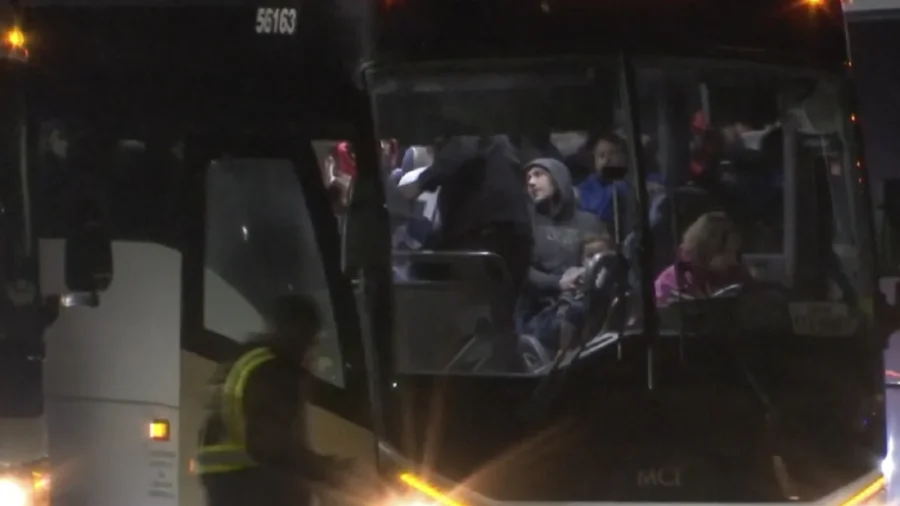TRENTON, N.J.—In Edison, New Jersey, the mayor warned he would send people back to the border if they came to his city in buses. In Rockford, Illinois, authorities said 355 illegal immigrants who landed on a charter flight wouldn’t be staying.
“NO MIGRANT BUSES THIS EXIT,” signs along Interstate 55 in Grundy County, Illinois, southwest of Chicago said ahead of Christmas weekend.
Nervous officials in suburbs and outlying cities near Chicago and New York are giving illegal immigrants arriving from the southern border a cold shoulder amid attempts to circumvent restrictions on buses in those two cities, opening a new front in response to efforts led by Texas Republican Gov. Greg Abbott to pay for illegal immigrants to leave his state.
The suburban backlash comes amid what the acting commissioner of U.S. Customs and Border Protection calls “unprecedented” arrivals, with illegal entries topping 10,000 several days last month. For months, big-city Democratic mayors including Eric Adams of New York and Brandon Johnson of Chicago have pleaded with the Biden administration for help addressing the influx.
Mr. Abbott has bused more than 80,000 illegal immigrants from Texas to Democratic-led cities since 2022, though some buses have also arrived from other states. Mr. Abbott’s administration also recently began chartering planes as Chicago and New York started cracking down on buses making unscheduled drop-offs, with fines and tickets.
A plane carrying 355 illegal immigrants from San Antonio landed at Chicago Rockford International Airport at 1 a.m. on New Year’s Eve, with local officials saying none left the airport that’s about 85 miles from downtown Chicago before boarding buses. The city of Chicago said illegal immigrants on the Boeing 777 boarded eight buses chartered by Mr. Abbott to be dropped off in “various suburbs.” A flight earlier in December brought 120 illegal immigrants to Chicago’s O’Hare International Airport.
Some Chicago suburbs also have adopted or are considering regulations on buses. Tinley Park’s ordinance vows to “cite, impound, or take other appropriate measures” against buses that make unannounced stops in the town of about 60,000 people. The village of Broadview, a suburb of 8,000 residents west of Chicago, said last week that it had to take action “because the unloading of passengers in inclement or severe weather without a coordinated plan poses a significant threat to the health, safety, and welfare” of the people aboard the buses.
In New Jersey, illegal immigrants are being dropped off at train stations in Jersey City, Secaucus, and Trenton, according to state officials. Democratic Gov. Phil Murphy’s office has said the state is primarily being used as a transit point and that “nearly all of them” are headed to New York. Mr. Murphy’s office said the state is working with federal and local authorities, but didn’t provide further details.
Mr. Murphy said last summer that New Jersey couldn’t support the arrivals amid discussion that the Biden administration was considering using the Atlantic City airport as a possible destination. It was a change of tune for Murphy, a self-styled progressive who first ran for governor in 2017 and suggested he would declare New Jersey a “sanctuary state,” a loose term for a place with immigrant-friendly policies.
Trenton Mayor Reed Gusciora said most illegal immigrants who arrived in his city have moved on to New York, but 10 people have stayed with family in the area.
“We empathize when someone is trying to seek asylum or when someone is trying to take them in. But we don’t have the capacity to take them in,” he said.
Edison Mayor Sam Joshi said in a Facebook post that he has “instructed our law enforcement and emergency management departments to charter a bus to transport the illegal migrants right back to the southern Texas/Mexican border.”
The mayors of New York and Chicago have blamed Mr. Abbott.
“This is a diabolical plan by this governor and we’re going to have to respond based on what he is doing,” Mr. Adams said Tuesday.
Hours after the flight landed in Rockford, Mr. Johnson told CBS’ “Face the Nation” that “Abbott is determined to continue to sow seeds of chaos” by having people arrive in the middle of the night with no notice.
On Thursday, New York City filed a lawsuit in state court, suing more than a dozen charter bus companies for $700 million, accusing them of illegally transporting tens of thousands of illegal immigrants from the southern border to the city under the direction of Mr. Abbott.
The lawsuit accuses 17 bus companies of participating in a “bad faith” relocation plan that violates state restrictions on abandoning “needy persons” in New York. It seeks financial damages to cover the cost of caring for an estimated 33,000 illegal immigrants that have arrived in the city on charter buses since the spring of 2022.
Mr. Abbott has defended his tactics by saying President Joe Biden needs to do more to secure the border. His spokesperson Renae Eze on Tuesday also renewed attacks on Democratic mayors, saying their hypocrisy “knows no bounds.”
Grundy County Sheriff Ken Briley said the highway signs south of Chicago were part of an emergency effort to avoid people being dropped off outside in the cold with no money, food, or winter clothes during the holiday weekend. No buses have stopped in the county, and the signs have since been removed, Mr. Briley said.
About 30 illegal immigrants from Venezuela were recently dropped off at 4:30 a.m. at a gas station in Kankakee County, according to Sheriff Mike Downey. The people “were left without money, food, adequate clothing, and were under the impression that they had reached their destination.”
“I don’t think this problem is going to stop,” said Mr. Briley. “We’re a rural community. We just don’t have the same kind of tax base that the city of Chicago does to be able to provide those resources.”

